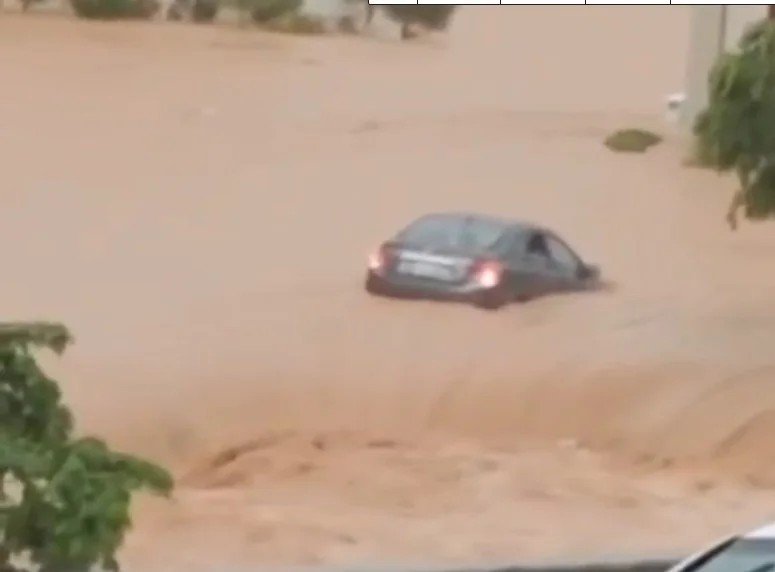A heartbreaking incident shook the city of Rawalpindi as a father and daughter were swept away in a sudden flash flood caused by torrential rains. The tragic event occurred on Wednesday morning near Range Road in the Westridge area, where their car plunged into a rainwater drain (commonly known as a “nullah”). The bodies of both victims were recovered after a tireless search and rescue operation by local authorities.
Incident Overview
The victims, identified as 28-year-old schoolteacher Anam Bashir and her father Bashir Ahmed, were traveling in a ride-hailing cab when the vehicle lost control and was pulled into a rapidly overflowing nullah due to heavy monsoon rains. Initial reports suggest that the vehicle was attempting to cross a flooded portion of the road when it was swept away by the forceful current.
According to eyewitnesses, the area had seen significant water accumulation overnight due to non-stop rain. The cab driver, unaware of the depth and strength of the water flow, tried to navigate through the inundated road, leading to the tragic accident.
Victims and Search Operation
The first victim to be recovered was Anam Bashir, whose body was found near Bhosa Godown, several kilometers downstream from where the car was last seen. She was described as a dedicated and well-respected teacher who had just begun her journey to work when the disaster struck.
Her father’s body was discovered the following day in River Soan, further highlighting the deadly strength of the rain-fed current. Rescue teams from Punjab Emergency Services (Rescue 1122) and other local authorities were involved in an extensive search that lasted nearly 36 hours.
The cab driver, later identified as Hussain Muawiya, also drowned in the incident. His body was recovered near the Soan River. His identity was confirmed through personal belongings, including a unique wristband he always wore.
Lack of Infrastructure and Warnings
This tragic event once again brings attention to the inadequacies in urban flood management and the lack of real-time warnings in Rawalpindi and other cities in Pakistan. Although heavy rainfall during the monsoon season is not new, the city’s drainage systems continue to fall short of handling high volumes of water, especially in low-lying or poorly constructed neighborhoods.
Several local residents have expressed frustration over the lack of proper signage, barriers, or alerts in flood-prone areas. Despite repeated warnings from the Meteorological Department about expected downpours, municipal authorities failed to close vulnerable roads or deploy emergency crews beforehand.
Public Reaction and Outrage
News of the incident sparked a wave of sadness and outrage on social media, with citizens questioning the city’s preparedness for monsoon season. Hashtags such as #RawalpindiFlood and #JusticeForAnam trended locally on Twitter and Facebook, demanding accountability from local government officials.
“This is not the first time we’ve seen lives lost due to negligence during the rains,” said a resident of Westridge, speaking to a local news outlet. “How many more families have to suffer before authorities act?”
Several NGOs and civil society groups have called for an independent investigation into the incident and urged the Punjab government to improve infrastructure planning, especially in areas near rainwater drains.
Government Response
In response to the public outcry, Rawalpindi Commissioner and Deputy Commissioner visited the site and offered condolences to the bereaved families. They have also announced compensation packages and promised a thorough review of the city’s flood control measures.
Punjab Chief Minister has ordered a fact-finding inquiry and directed the Water and Sanitation Agency (WASA) and Rawalpindi Municipal Corporation to immediately identify all critical flooding hotspots and take urgent preventive measures.
A Larger Pattern
Unfortunately, this tragedy is not isolated. Every year during Pakistan’s monsoon season, dozens of lives are lost due to similar flash floods and accidents. Urban centers like Rawalpindi, Lahore, and Karachi frequently experience chaos due to poorly maintained drainage systems and unauthorized constructions along natural watercourses.
Experts have repeatedly called for sustainable urban planning and disaster risk reduction frameworks to mitigate the risks posed by climate change and unplanned urban growth.
Conclusion
The loss of Anam Bashir, her father, and their driver is a grim reminder of the human cost of infrastructural neglect and inadequate disaster preparedness. As their families mourn the untimely deaths, their story adds to the growing call for systemic reforms that prioritize public safety, especially in the face of predictable seasonal hazards.
Until meaningful action is taken, the monsoon season will continue to bring not just rain—but tragedy—for too many in Pakistan.
Reference: راولپنڈی:برساتی نالے میں کار سوار باپ بیٹی بہہ گئے،تلاش جاری







